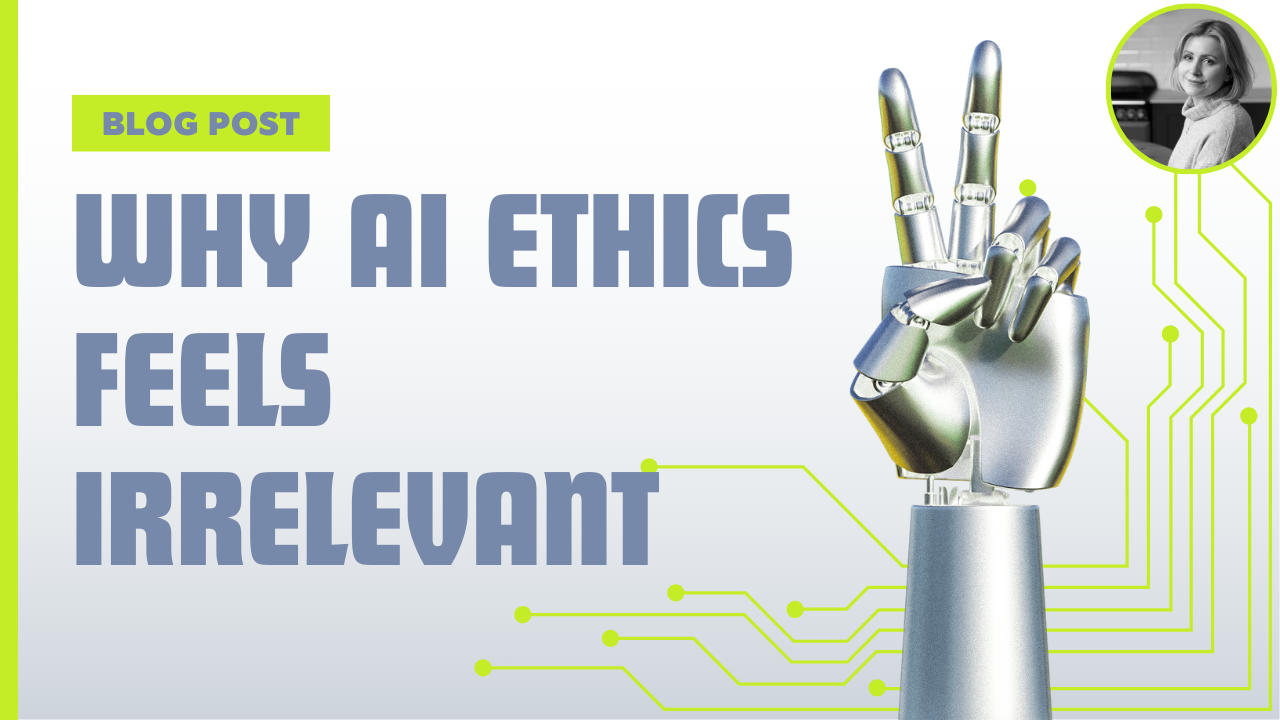Why AI ethics feels irrelevant to business (but isn't)
Sep 16, 2025
![]()
![]()
|
I'm a copywriter by trade, so I love a spiky, memorable brand name that gets people talking. Nobody Cares About Ethics certainly ticks that box. But there's more to this name than cheap attention gaming — it speaks to a frustration I'm confronting head-on with this business. The disconnect between AI ethics theory and practicePicture me deep in AI ethics study mode, wrestling with the moral implications of autonomous vehicles making split-second decisions about who to save in a crash. Important stuff, for sure. But as I sat there, a little thought kept nagging: how many people programme driverless cars for a living? Not that many, I don't think... Which is when the disconnect hit me. Here I was, absorbing all this crucial thinking about AI ethics, yet none of it addressed the decisions we're all making at work every day — whether to use AI for recruitment, how to handle customer data in chatbots, what to do when AI tools show bias in their outputs. The AI hype makes ethics feel irrelevantThe breathless excitement, the "move fast and break stuff" mentality, the fear of being left behind in some imaginary AI arms race — it all made ethics feel like an inconvenient speed bump. Worse still, I kept seeing on LinkedIn how anyone raising genuine concerns about responsible AI use was getting painted as a luddite, isolated and dismissed as anti-progress when they were actually on the side of sustainable innovation. Then, something clicked. People weren't dismissing ethics because they didn't care — they were dismissing it because it felt irrelevant to their reality, and the hype made it feel like a luxury they couldn't afford. The gap wasn't in their values; it was in how ethics was being presented. A better approach to AI ethics in businessI realised that to get people taking AI ethics seriously and to see it as a catalyst to progress rather than a barrier, I needed to start asking better questions. Not "should a driverless car prioritise the passenger or pedestrian?" but "how do you decide whether that AI tool is right for your team?" And move the conversation beyond philosophical thought experiments towards practical decision-making frameworks for the choices people face in their jobs every day. Because, it turns out people care deeply about doing the right thing — about fairness, transparency, not causing harm. They just couldn't see how traditional ethics discussions connected to their work in the real world. This core belief shapes everything I do at Nobody Cares About Ethics. What practical AI ethics looks likeEveryone I work with walks away with practical frameworks to evaluate both day-to-day and big important AI decisions through an ethical lens. Instead of compliance tick-boxing, they get tools for transparent, inclusive, holistic decision-making that goes beyond short-term gains to long-term sustainability. But perhaps the biggest transformation I witness is what happens when I create a safe space where teams can share their big feelings about AI —because it's such an emotive subject. When people can express their genuine concerns without being dismissed as luddites. When the AI enthusiasts can acknowledge the risks (and their personal worries, even enthusiasts have these) alongside the opportunities. That's when teams stop talking at cross purposes and find a productive way forward together. Side note: I genuinely believe enthusiasts and sceptics can and should work together on AI — diversity of thought, handled constructively, makes teams stronger. The wider benefits for businessThe results go waaay beyond compliance and risk management (which are obvs important too). People have more constructive conversations about AI by exploring grey areas together. Teams feel empowered to lead the conversation on responsible AI use rather than being led by hype or uninformed client demands. Organisations break down silos through systems thinking. Businesses create environments where responsible innovation thrives out in the open, built on trust through transparency. So "Nobody Cares About Ethics" isn't really true. It's more like "Nobody Cares About Ethics When It's Presented in Ways That Don't Matter to Them." But that doesn't really have the same ring to it... |
